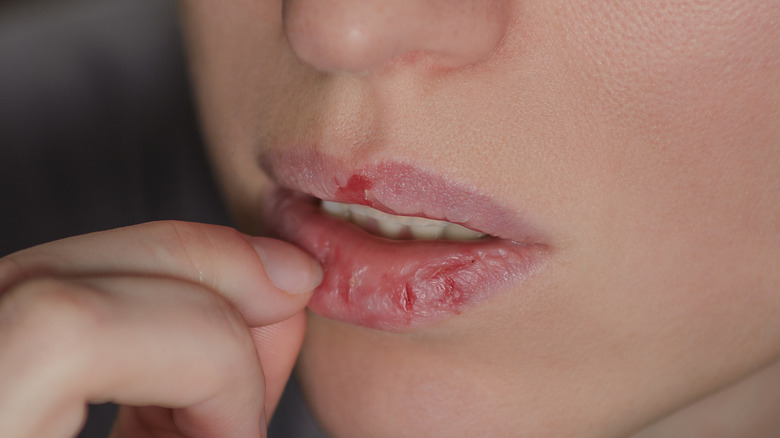Healthy Replacements For Your Picking, Biting, And Scratching Habits
Approximately 1 in 20 people have body-focused repetitive behaviors, or BFRB. According to WebMD, body-focused repetitive behaviors are intense urges where people bite, pick, or pull at their skin and cause damage. It's easier to address outrageous spending habits or avoid stimulating habits for a good night's sleep, but it's difficult dealing with compulsive and body-focused issues. Some of the most common BFRBs — in line with habits like picking, biting, and scratching — are trichotillomania (hair pulling), excoriation (skin picking), and onychophagia (nail biting).
Defeating these pesky habits isn't easy, but the result is exceedingly worth it. According to psychology professor Wendy Wood, "If you want to change a behavior, then try to identify what might be a trigger that generates the behavior," she explained to Wired. With repetitive and body-focused habits, triggers are often rooted in anxiety and compensated for with compulsions. Lucky for us, there are a number of ways to address these issues while finding effective alternatives. Let's jump in.
Give yourself an incentive
Rather than simply having an intention in mind, it may be helpful to give yourself a reason not to pick, bite, or scratch. For example, paint your nails or apply acrylics, cover arms with tight full sleeves, or wear gloves to reduce damage. According to board-certified dermatologist and psychiatrist Dr. Amy Wechsler, "If something is covered, then it's hard to access, and when you try to get to them but can't, that's enough time for you to think, Oh, I shouldn't be doing this," she explained to MindBodyGreen, listing a few examples herself. "Sometimes my patients will be walking around with lots of Band-Aids, but it's the only way to heal things."
With an incentive that can act as a physical barrier, you'll be stopped in your tracks repeatedly. Although unlearning habits takes time, so does learning them — both are a result of repeated action. If a manicure or other luxury treatment is in your budget, it may incentivize you to take better care of your skin (while looking super glam).
Keep your hands busy
Hobbies can save you from unhealthy habits. Even better, developing a new hobby can help you throw out an old habit. Moving your body — through walking, running, stretching, and even spending time with friends — can help relieve some of the stressful feelings that lead to body-focused repetitive behaviors. In accordance with the executive director of TLC's Foundation for Body-Focused Repetitive Disorders, "One theory is that picking is a self-regulating behavior — it stimulates us when we are bored or sedentary (watching TV, at the computer, talking on the phone), and calms us when we are overstimulated (whether by negative emotions or stress, or positive excitement)," she explained to MBG.
With that in mind, identify a self-regulating behavior that aligns with your lifestyle and run with it. If you continue to struggle with repetitive actions while engaging in mundane hobbies, ask a friend to join you in breaking habits together (and holding both of you accountable). Essentially, avoid picking, biting, and scratching by moving your body in different and more efficient ways.
Feelings journal
When you're ready to get to the root of the problem, invest in a feelings journal. A journal will allow you to directly identify and address triggers, while slowly understanding what helps you cope with overwhelming feelings. Try developing a log system to notice, understand, and release complicated feelings — for example, "I started to do x. It was because I was feeling y. I release these feelings and will try to replace the habit with z." While that's just a template to get you started, feel free to go further into the action, how you're feeling, and what it means for you to let it go.
If you're not someone who enjoys journaling, try keeping a notepad around instead. Although there are a number of mental health benefits when you start journaling, writing in general can provide some relief and allow you to reflect. When you're feeling a strong urge to bite, pick, or scratch, you'll have an alternative coping mechanism on hand.
Behavioral therapy
Therapy is a privilege — but if you're able to access it, it can do wonders for repetitive disorders. According to The TLC Foundation for Body-Focused Repetitive Disorders, cognitive behavioral therapy (CBT) can help approach repetitive disorders through a psychiatric lens, helping you identify and actively change mental, emotional, and physical patterns caused by stress. Though there are a number of therapeutic approaches when it comes to CBT, habit reversal training has proven to be the most effective, per The TLC Foundation. The method approaches repetitive habits through three components that tackle awareness, response, and social support. There are many informative guides to get started on habit reversal training.
In addition, behavioral therapy tackles other methods of habit reversal, like comprehensive behavioral treatment, acceptance and commitment therapy, and dialectical behavior therapy, all of which can uniquely address patterns and habits that can be detrimental to our health. Breaking a habit — especially one that helps you manage overwhelming feelings — isn't easy. With the right tools and resources, however, it's still possible.




